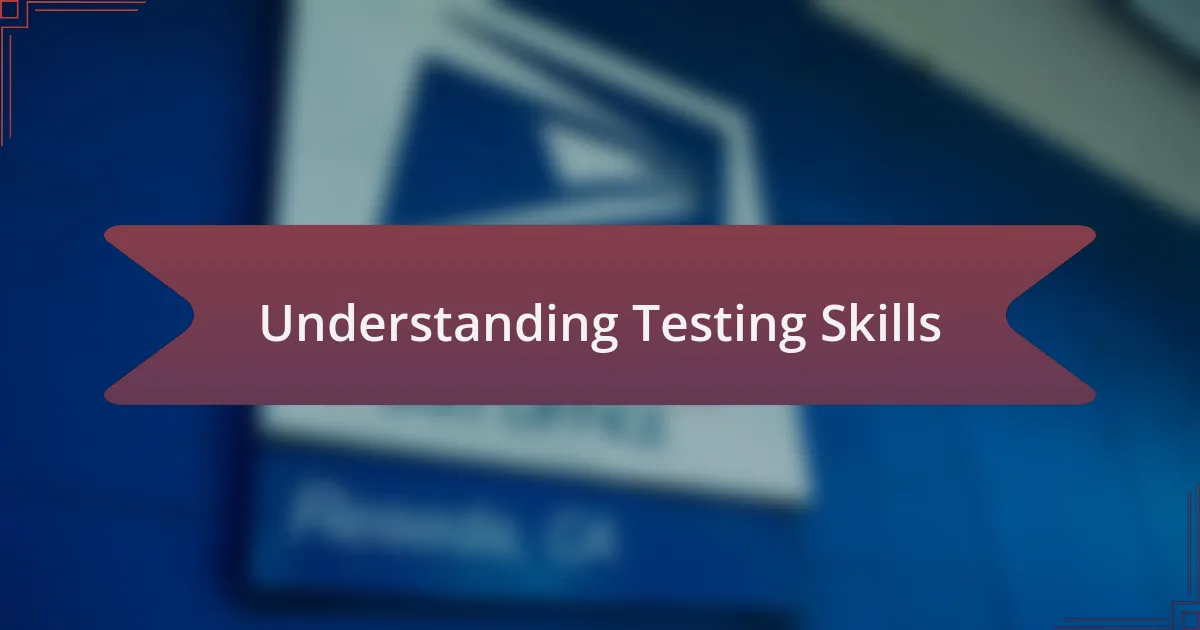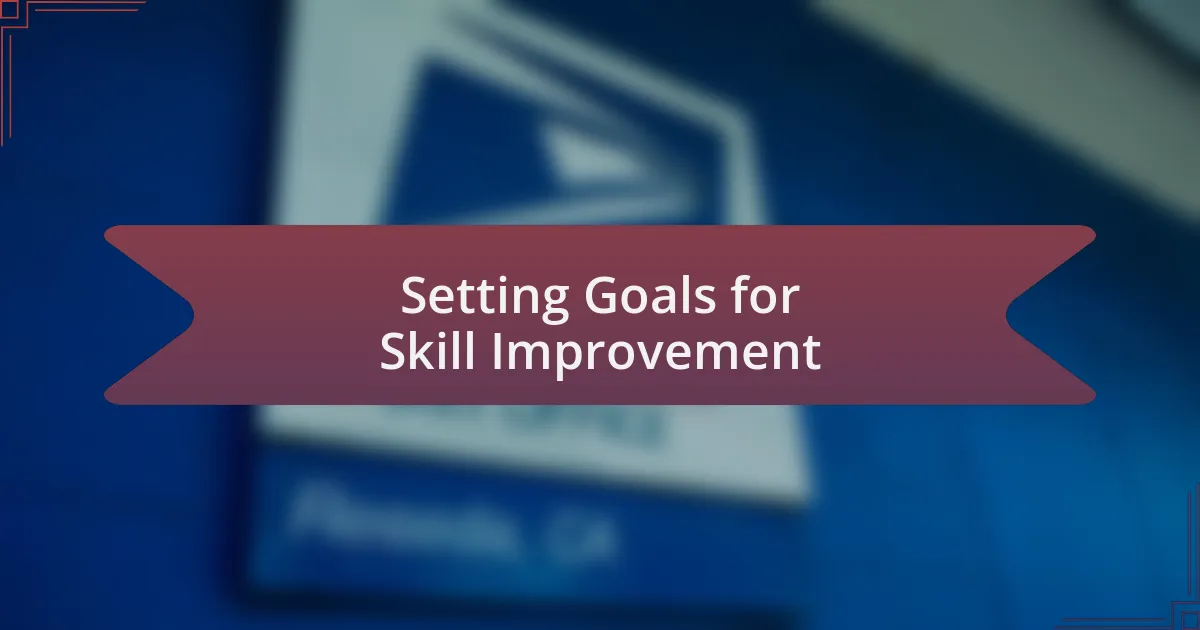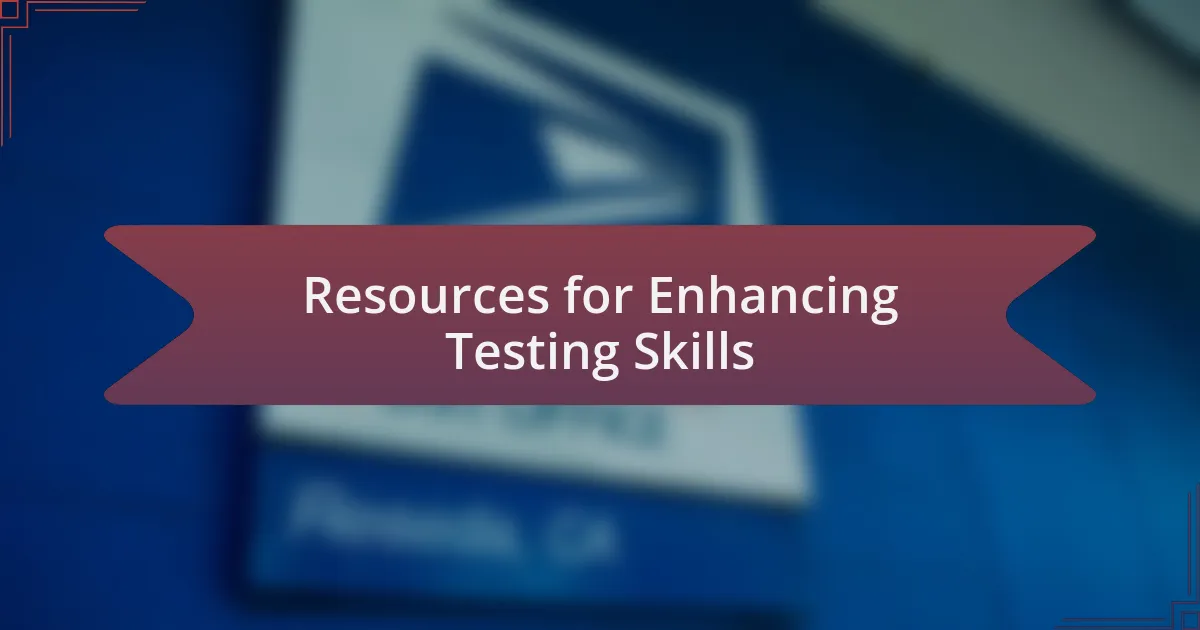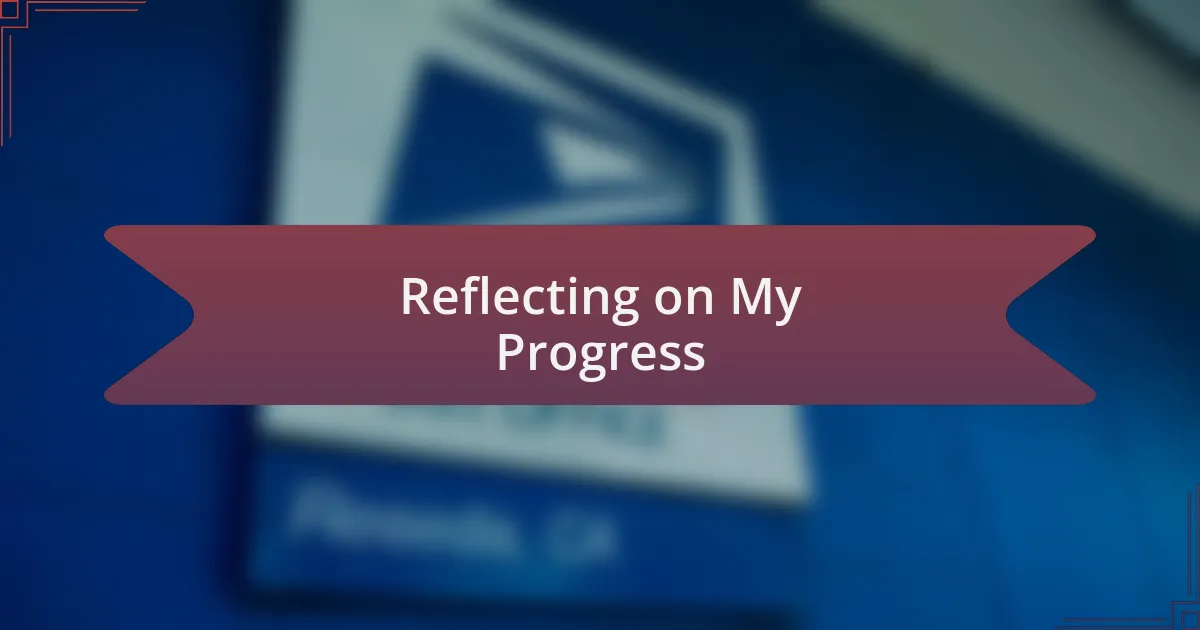Key takeaways:
- Understanding testing skills is essential for delivering high-quality software, focusing on user needs rather than just finding errors.
- Setting clear and SMART goals for skill improvement, such as enhancing automation test coverage, can lead to significant project and personal growth.
- Utilizing diverse resources like online courses, books, and community engagement enriches knowledge and fosters a supportive network for continuous learning.
- Regular reflection on testing practices helps identify weaknesses and refine techniques, ultimately boosting confidence and competence in testing abilities.

Understanding Testing Skills
Understanding testing skills is crucial for any software developer who wants to deliver high-quality products. I remember a project where I overlooked a simple bug because I didn’t fully grasp the context of the requirements. It’s moments like those that make you realize the importance of not just knowing how to test, but understanding why you test.
Testing is not merely about finding errors; it’s about ensuring that the software meets the user’s needs. Have you ever been in a situation where a feature you released didn’t work as intended? I have, and I learned quickly that empathizing with the end user can vastly improve your testing approach. It’s that deep understanding that translates into more effective and comprehensive test cases.
In my experience, testing skills encompass various methods, from manual to automated testing. I found that gaining proficiency in automated testing tools opened new doors for me, but it wasn’t until I truly understood the testing lifecycle that I realized how interlinked everything is. Do you often feel overwhelmed by the different testing methodologies? Trust me, it becomes easier when you see the bigger picture—understanding the purpose behind each method can transform how you approach your work.

Common Testing Techniques and Strategies
When diving into common testing techniques, I often turn to exploratory testing, a strategy that emphasizes the tester’s intuition and experience. This method has served me well, especially in situations where time constraints limit formal testing. Have you ever relied on your gut feeling to identify user scenarios? I can recall a time when I uncovered a significant flaw simply by navigating the application as a user, trusting my instincts over a scripted test case.
Another fundamental approach is unit testing, which focuses on validating individual components of the software. I remember the sense of satisfaction I felt after implementing unit tests for a complex function; those early checks caught issues that could have snowballed into major problems later in the development cycle. This kind of proactive testing not only saves time but also builds a stronger foundation for the project. How do you feel when you know your code is more robust because of thorough unit tests? That reassurance is invaluable.
On the automation front, I became particularly enamored with regression testing, which ensures that new code doesn’t disrupt existing functionality. I still vividly recall the relief I felt when the automation script I created detected a critical issue right before launch. It reinforced the idea that automation can dramatically enhance efficiency and accuracy in testing. Are you leveraging tools that streamline your workflow? Embracing these automated techniques can free up valuable time for more strategic testing efforts.

Identifying My Weaknesses in Testing
I realized my weaknesses in testing during a challenging project where time was of the essence. I noticed that I often rushed through tests, skipping critical edge cases because I focused too much on completing the task quickly. Have you ever felt that pressure? It made me reflect on how prioritizing speed over thoroughness could lead to missed defects that linger in the final product.
Another area I discovered needed improvement was my attention to detail. While going through a peer’s code, I caught a minor bug that had slipped past me multiple times in my own tests. That moment struck me: why was I so much more vigilant when reviewing someone else’s work? It was a wake-up call about the importance of maintaining a meticulous mindset, regardless of whether I was the one writing the tests or reviewing them.
Lastly, I found that I was lacking in documentation skills. Many times, I would finish a testing session and walk away without properly logging the outcomes. Reflecting on this, I knew it hampered my ability to learn from past mistakes. Do you ever overlook this aspect too? A well-documented testing process is crucial for ongoing improvement, and acknowledging that has motivated me to make it a priority in my workflow.

Setting Goals for Skill Improvement
Setting clear goals for skill improvement in testing has been a game changer for me. When I started focusing on what I wanted to achieve, it became easier to identify the specific areas I needed to work on. For instance, I set a goal to enhance my automation test coverage, which not only boosted my confidence but also made a tangible difference in our project timelines.
One technique that worked well for me was creating SMART goals—Specific, Measurable, Achievable, Relevant, and Time-bound. I remember committing to spend an hour each week learning about new testing tools. This dedication not only kept my skills current but also sparked excitement in me as I discovered better ways to streamline processes. Have you ever tracked your progress toward a goal? Seeing my gradual improvement motivated me to keep pushing forward.
Ultimately, it’s about maintaining focus and adjusting your goals as you grow. I learned that what seems important today might shift as I gain more experience. Regularly revisiting my goals allowed me to stay aligned with my career trajectory and ensured I was investing my time wisely. It’s amazing how goal-setting can transform your learning journey—have you tried adapting yours?

Resources for Enhancing Testing Skills
When it comes to enhancing my testing skills, I’ve found a wealth of resources that really made a difference. Online courses, like those on platforms such as Udemy or Coursera, have provided me with structured learning paths that I could follow at my own pace. I vividly remember completing a course on Test Automation; it opened my eyes to new frameworks and best practices that I hadn’t encountered before. Have you considered exploring online courses to advance your own skills?
Books also played a pivotal role in my development. I still recall the insights I gained from “Lessons Learned in Software Testing.” It was like having a mentor guiding me through real-world scenarios, which made me reflect on my experiences. Every chapter felt like a conversation, and I often found myself jotting down notes or questions. Have any books inspired your testing journey?
Lastly, engaging with communities—from forums like Stack Overflow to local meetups—has been invaluable. Sharing challenges and solutions with peers has not only deepened my understanding but also created a network of support. I remember discussing a particularly tricky testing issue with my peers, and the collaborative brainstorming illuminated multiple perspectives. Have you tapped into those community resources to help refine your skills?

Reflecting on My Progress
Reflecting on my progress, I can see a clear evolution in my testing abilities. Initially, I often felt overwhelmed by the complexity of different testing methodologies. However, as I immersed myself in the learning resources I discovered, each new technique I implemented felt like a small victory. Do you remember the first time you successfully identified a bug? For me, that moment was a significant turning point, instilling a newfound confidence in my skills.
I’ve also become more mindful of my learning journey. I make it a point to regularly review my previous tests and assess what went well and what could improve. This retrospective approach has helped me identify recurring patterns in my testing strategies, enabling me to refine my techniques further. Have you taken the time to look back at your work? Those reflections can spark insights that propel you forward.
In moments of doubt, I remind myself of the progress I’ve made, and that fuels my motivation. For instance, the first unit test I wrote felt insurmountable, but now it’s a routine part of my process. It’s as if each success builds on the last, creating a strong foundation. Have you ever felt the same way about your accomplishments? Recognizing our growth can be just as powerful as the skills we acquire along the way.